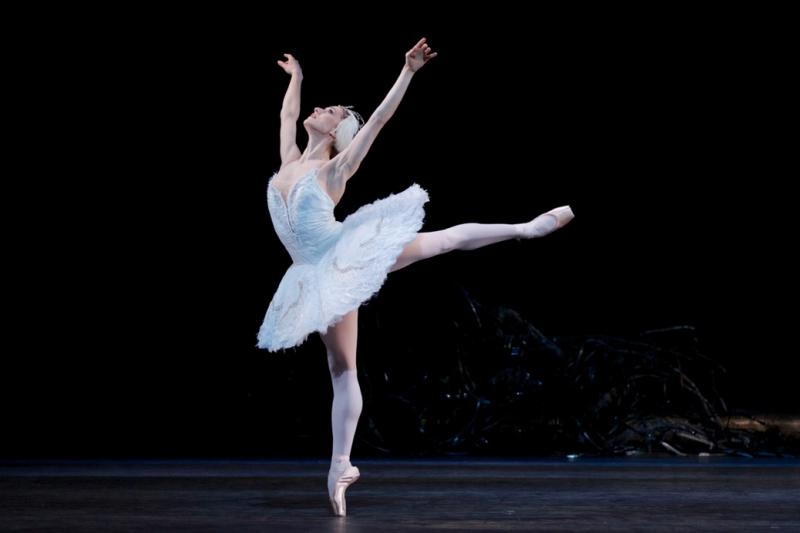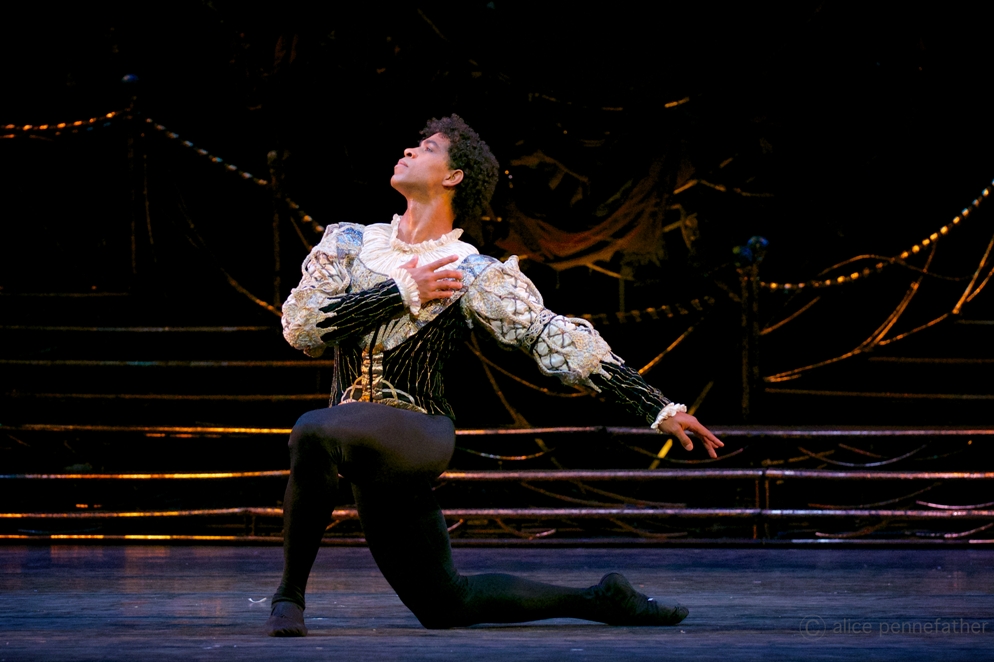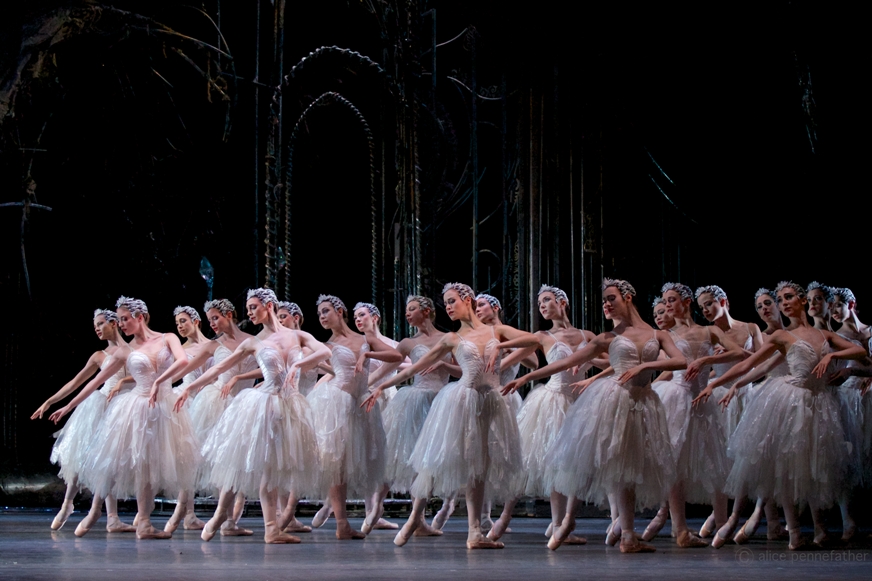Swan Lake, Royal Ballet | reviews, news & interviews
Swan Lake, Royal Ballet
Swan Lake, Royal Ballet
Marianela Nuñez's dream Odette/Odile distracts from hideous designs and score butchery

Is there an art-form more tied to bad as well as good tradition than classical ballet? Yolanda Sonnabend’s unatmospherically if expensively kitsch designs for this Swan Lake wouldn’t have lasted more than a season or two in the worlds of theatre and opera, yet here they still are in Anthony Dowell’s soon-to-be-retired homage to Petipa and Ivanov, first seen in 1987 and due to take Swan Lake at Covent Garden past the 1000th performance in the present run.
At least the score, such as it is here, sounds plangent and pliant under veteran ballet conductor Boris Gruzin. Matching it for magical suppleness on the first night was the peerless performance of Marianela Nuñez, gliding in at short notice to replace an indisposed Sarah Lamb. Of coure Nuñez knows her Odette, infinitely more touching in swan-quivers and human vulnerability than Alina Cojocaru’s recent performance for English National Ballet, and she matches Cojocaru for sly brilliance as decoy Odile.
 It’s there, in the “Black Swan” pas de deux of Act Three, that Carlos Acosta (pictured right in Act Three) comes into his own, controlled in his muscularity to complement Nuñez’s perfect fouettés if not quite as abandoned in his joyfulness as of yore. Yet is there a duller part for a principal male dancer in the first two and a half acts? The mime of this Act One doesn’t even make it quite clear why Prince Siegfried should eventually be troubled on his birthday – a striking contrast to the persistent melancholy and petulance with which Ivan Vasiliev at ENB made us aware that a story would eventually evolve. Though there’s no Nureyev-style interpolation for this prince, David Bintley’s choreography of the big waltz, moved to a later spot in the action and suavely conducted by Gruzin, does give Acosta a minute to dance properly, but that’s it for an hour. Emma Maguire, Francesca Hayward and Alexander Campbell go quite some way to making elegant amends in the the pretty pas de trois, and Alastair Marriott even manages to make us laugh as the tipsy tutor, but everyone’s waiting for the lakeside act.
It’s there, in the “Black Swan” pas de deux of Act Three, that Carlos Acosta (pictured right in Act Three) comes into his own, controlled in his muscularity to complement Nuñez’s perfect fouettés if not quite as abandoned in his joyfulness as of yore. Yet is there a duller part for a principal male dancer in the first two and a half acts? The mime of this Act One doesn’t even make it quite clear why Prince Siegfried should eventually be troubled on his birthday – a striking contrast to the persistent melancholy and petulance with which Ivan Vasiliev at ENB made us aware that a story would eventually evolve. Though there’s no Nureyev-style interpolation for this prince, David Bintley’s choreography of the big waltz, moved to a later spot in the action and suavely conducted by Gruzin, does give Acosta a minute to dance properly, but that’s it for an hour. Emma Maguire, Francesca Hayward and Alexander Campbell go quite some way to making elegant amends in the the pretty pas de trois, and Alastair Marriott even manages to make us laugh as the tipsy tutor, but everyone’s waiting for the lakeside act.
 Which looks pure bling, further sabotaged by Sonnabend’s making tallish Gary Avis’s villain look like an especially dumpy owl. Odette is set apart from her maidens by her tutu – no need for the long arms of Svetlana Zakharova or Zenaida Yanowsky to make her stand out from the swan-crowd – but why do they have to look like tacky sylphides in shiny tulle (pictured above)? If you want traditional, then it doesn’t come any better than ENB’s blue lights on white multiple tutus. Not that the corps here does a bad job, though the four cygnets look all too deadpan and I don’t understand why the original choreography gave the dashing reprise of the collective waltz to two ballerinas. At least the crucial pas d’action is pure unforced poetry from Nuñez, complemented by a violin solo from co-leader Sergey Levitin which manages to fill the customary slow tempo.
Which looks pure bling, further sabotaged by Sonnabend’s making tallish Gary Avis’s villain look like an especially dumpy owl. Odette is set apart from her maidens by her tutu – no need for the long arms of Svetlana Zakharova or Zenaida Yanowsky to make her stand out from the swan-crowd – but why do they have to look like tacky sylphides in shiny tulle (pictured above)? If you want traditional, then it doesn’t come any better than ENB’s blue lights on white multiple tutus. Not that the corps here does a bad job, though the four cygnets look all too deadpan and I don’t understand why the original choreography gave the dashing reprise of the collective waltz to two ballerinas. At least the crucial pas d’action is pure unforced poetry from Nuñez, complemented by a violin solo from co-leader Sergey Levitin which manages to fill the customary slow tempo.
The ball scene is a crowded fright, and any attempts at evoking late-imperial Russia at the palace are rendered daft by Mohicaned Von Rothbart and his skull-headed attendants; why would Genesia Rosato’s classy princess not bat an eyelid at their coming anywhere near her? The national dances feel cumbersome, other than the predictable charm of the Neapolitans in Frederick Ashton’s elaborate routine, winningly executed by Laura Morera and Ricardo Cervera.
It strikes me as odd that there should be a second interval almost as long as the final act which follows it; another bad tradition. Nuñez wasn’t the only lady in the house who had changed character; coming back to my seat, I found the dance critic next to me turned into another person, a very friendly one, who told me her friend had left. When I raised an eyebrow, she explained: "the real dancing is over". Not good for Tchaikovsky’s fluent denouement – except, of course, that it’s anything but, with Drigo’s ridiculous insertion of two completely unsuitable Tchaikovsky piano-piece arrangements and his excision of the masterfully sad original number for the corps. English National Ballet at least restores that. Still, no classical version tells the final tragedy anything like as movingly as what has rightly become “Matthew Bourne’s Swan Lake”. Relatively short on elaborate dance it may be, but that’s where you have to go to find something more like “Tchaikovsky’s Swan Lake” too. This production, on the other hand, can’t be retired quickly enough.
rating
Share this article
Add comment
The future of Arts Journalism
You can stop theartsdesk.com closing!
We urgently need financing to survive. Our fundraising drive has thus far raised £49,000 but we need to reach £100,000 or we will be forced to close. Please contribute here: https://gofund.me/c3f6033d
And if you can forward this information to anyone who might assist, we’d be grateful.

Subscribe to theartsdesk.com
Thank you for continuing to read our work on theartsdesk.com. For unlimited access to every article in its entirety, including our archive of more than 15,000 pieces, we're asking for £5 per month or £40 per year. We feel it's a very good deal, and hope you do too.
To take a subscription now simply click here.
And if you're looking for that extra gift for a friend or family member, why not treat them to a theartsdesk.com gift subscription?
more Dance
 'We are bowled over!' Thank you for your messages of love and support
Much-appreciated words of commendation from readers and the cultural community
'We are bowled over!' Thank you for your messages of love and support
Much-appreciated words of commendation from readers and the cultural community
 R:Evolution, English National Ballet, Sadler's Wells review - a vibrant survey of ballet in four acts
ENB set the bar high with this mixed bill, but they meet its challenges thrillingly
R:Evolution, English National Ballet, Sadler's Wells review - a vibrant survey of ballet in four acts
ENB set the bar high with this mixed bill, but they meet its challenges thrillingly
 Like Water for Chocolate, Royal Ballet review - splendid dancing and sets, but there's too much plot
Christopher Wheeldon's version looks great but is too muddling to connect with fully
Like Water for Chocolate, Royal Ballet review - splendid dancing and sets, but there's too much plot
Christopher Wheeldon's version looks great but is too muddling to connect with fully
 iD-Reloaded, Cirque Éloize, Marlowe Theatre, Canterbury review - attitude, energy and invention
A riotous blend of urban dance music, hip hop and contemporary circus
iD-Reloaded, Cirque Éloize, Marlowe Theatre, Canterbury review - attitude, energy and invention
A riotous blend of urban dance music, hip hop and contemporary circus
 How to be a Dancer in 72,000 Easy Lessons, Teaċ Daṁsa review - a riveting account of a life in dance
Michael Keegan-Dolan's unique hybrid of physical theatre and comic monologue
How to be a Dancer in 72,000 Easy Lessons, Teaċ Daṁsa review - a riveting account of a life in dance
Michael Keegan-Dolan's unique hybrid of physical theatre and comic monologue
 A Single Man, Linbury Theatre review - an anatomy of melancholy, with breaks in the clouds
Ed Watson and Jonathan Goddard are extraordinary in Jonathan Watkins' dance theatre adaptation of Isherwood's novel
A Single Man, Linbury Theatre review - an anatomy of melancholy, with breaks in the clouds
Ed Watson and Jonathan Goddard are extraordinary in Jonathan Watkins' dance theatre adaptation of Isherwood's novel
 Peaky Blinders: The Redemption of Thomas Shelby, Rambert, Sadler's Wells review - exciting dancing, if you can see it
Six TV series reduced to 100 minutes' dance time doesn't quite compute
Peaky Blinders: The Redemption of Thomas Shelby, Rambert, Sadler's Wells review - exciting dancing, if you can see it
Six TV series reduced to 100 minutes' dance time doesn't quite compute
 Giselle, National Ballet of Japan review - return of a classic, refreshed and impeccably danced
First visit by Miyako Yoshida's company leaves you wanting more
Giselle, National Ballet of Japan review - return of a classic, refreshed and impeccably danced
First visit by Miyako Yoshida's company leaves you wanting more
 Quadrophenia, Sadler's Wells review - missed opportunity to give new stage life to a Who classic
The brilliant cast need a tighter score and a stronger narrative
Quadrophenia, Sadler's Wells review - missed opportunity to give new stage life to a Who classic
The brilliant cast need a tighter score and a stronger narrative
 The Midnight Bell, Sadler's Wells review - a first reprise for one of Matthew Bourne's most compelling shows to date
The after-hours lives of the sad and lonely are drawn with compassion, originality and skill
The Midnight Bell, Sadler's Wells review - a first reprise for one of Matthew Bourne's most compelling shows to date
The after-hours lives of the sad and lonely are drawn with compassion, originality and skill
 Ballet to Broadway: Wheeldon Works, Royal Ballet review - the impressive range and reach of Christopher Wheeldon's craft
The title says it: as dancemaker, as creative magnet, the man clearly works his socks off
Ballet to Broadway: Wheeldon Works, Royal Ballet review - the impressive range and reach of Christopher Wheeldon's craft
The title says it: as dancemaker, as creative magnet, the man clearly works his socks off
 The Forsythe Programme, English National Ballet review - brains, beauty and bravura
Once again the veteran choreographer and maverick William Forsythe raises ENB's game
The Forsythe Programme, English National Ballet review - brains, beauty and bravura
Once again the veteran choreographer and maverick William Forsythe raises ENB's game

Comments
But David, Yuhui Choe wasn't
I shouldn't have trusted the
I shouldn't have trusted the evening's cast list, which still had Sarah Lamb on it (an announcement should have been made). I'll go in and correct, but for the record I wasn't angry in Act One, despite the change of order.
But the evening's cast list
That's what I wrote: the cast
That's what I wrote: the cast list was wrong on both counts. As a critic, I got the press release, but I didn't see the supplementary leaflet, whatever that was, nor the screens in the foyer. Not enough: if they couldn't have got the cast list reprinted with two days' notice, someone should have come out and announced the changes.
If you want to see an